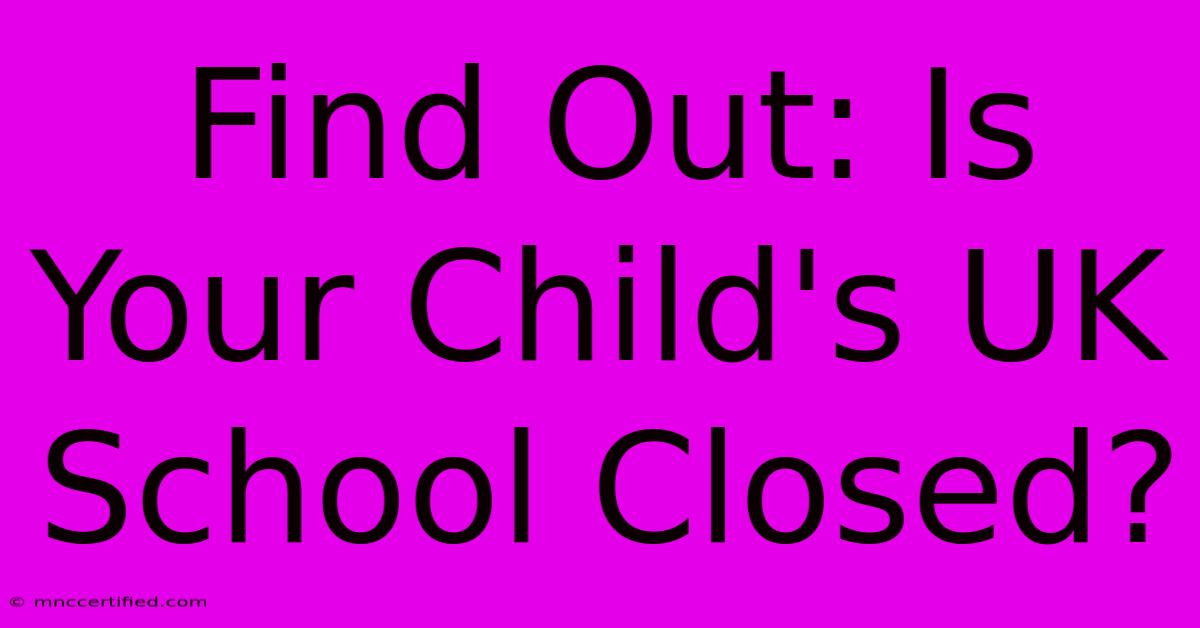Find Out: Is Your Child's UK School Closed?

Table of Contents
Find Out: Is Your Child's UK School Closed? A Comprehensive Guide
Finding out whether your child's UK school is closed can be stressful, especially during unexpected events. This guide provides a comprehensive overview of the various methods to check school closures quickly and efficiently, ensuring you're always informed.
Why Checking School Closures is Crucial
Knowing whether your child's school is closed is essential for several reasons:
- Childcare Arrangements: A sudden closure requires immediate adjustments to childcare plans, potentially impacting work schedules and other commitments.
- Safety and Wellbeing: Being aware of closures ensures your child's safety and prevents unnecessary journeys to a closed school.
- Missed Learning: Knowing about closures allows you to plan for alternative learning activities to minimise disruption to your child's education.
- Reduced Stress: Having a reliable method for checking school closures reduces anxiety and uncertainty during disruptive events.
Reliable Ways to Check UK School Closures
Several dependable methods help you determine if your child's school is closed:
1. The School Website:
This is often the first and most reliable source. Most UK schools have a dedicated section on their website for announcements, news, and emergency closures. Look for sections titled "News," "Announcements," "Closures," or "Contact Us." Many schools also use social media (see below) to announce closures.
2. School Communication Systems:
Many schools utilize email, SMS (text message), or dedicated apps to communicate directly with parents. Ensure your contact details are up-to-date with the school. Check your inbox and phone regularly, particularly during inclement weather or periods of potential disruption.
3. Local Radio and Television:
Local news broadcasts often announce school closures during severe weather or emergencies. Check your local radio or television stations for updates.
4. Social Media:
Many schools use social media platforms like Twitter and Facebook to communicate with parents and the wider community. Follow your school's official social media pages for timely updates. Be aware of unofficial sources and only rely on verified school accounts.
5. Council Websites:
Some local councils maintain websites listing school closures within their area. Check your local council's website for a dedicated education or schools section. Search for "[Your Local Council] school closures."
6. Government Websites:
In the case of national emergencies, the government might publish lists of affected schools. Websites such as the Department for Education may provide relevant information.
Proactive Measures to Stay Informed:
- Save important contact numbers: Keep the school's phone number and website URL readily accessible.
- Register for school alerts: Sign up for email or SMS alerts from your child's school to receive immediate notifications.
- Check regularly: Particularly during adverse weather conditions, check for closure announcements proactively.
Dealing with School Closures:
If your child's school is closed, consider these points:
- Alternative childcare arrangements: Have a backup plan in place for childcare if the school is unexpectedly closed.
- Home learning activities: Engage your child in learning activities at home to minimise disruption to their education.
- Contact the school: If you have any questions or concerns, contact the school directly via phone or email.
By utilizing these strategies, you can ensure you're always informed about your child's school's status and prepared for any unexpected closures. Remember, being proactive and having multiple methods for checking will help minimize stress and ensure your child's wellbeing.

Thank you for visiting our website wich cover about Find Out: Is Your Child's UK School Closed?. We hope the information provided has been useful to you. Feel free to contact us if you have any questions or need further assistance. See you next time and dont miss to bookmark.
Featured Posts
-
Croatia Games Modrics Holy Call
Nov 19, 2024
-
Nix Payton Broncos Offense Clicks
Nov 19, 2024
-
Empire Dental Insurance Providers
Nov 19, 2024
-
Sagesure Insurance Am Best Rating
Nov 19, 2024
-
Spider Stacy On Shane Mac Gowan And The Pogues
Nov 19, 2024